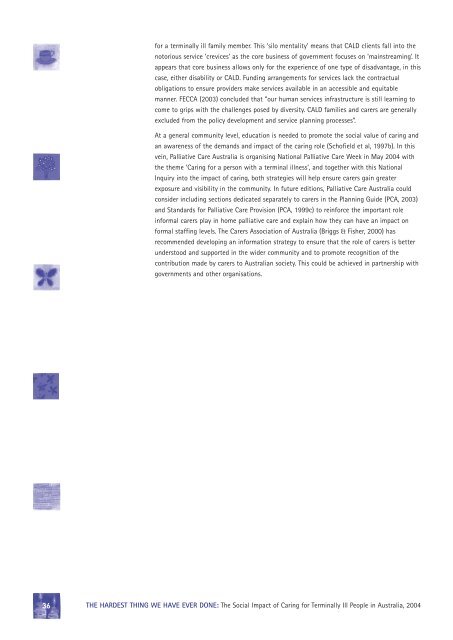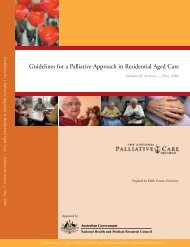The hardest thing we have ever done - Palliative Care Australia
The hardest thing we have ever done - Palliative Care Australia
The hardest thing we have ever done - Palliative Care Australia
You also want an ePaper? Increase the reach of your titles
YUMPU automatically turns print PDFs into web optimized ePapers that Google loves.
for a terminally ill family member. This ‘silo mentality’ means that CALD clients fall into the<br />
notorious service ‘crevices’ as the core business of government focuses on ‘mainstreaming’. It<br />
appears that core business allows only for the experience of one type of disadvantage, in this<br />
case, either disability or CALD. Funding arrangements for services lack the contractual<br />
obligations to ensure providers make services available in an accessible and equitable<br />
manner. FECCA (2003) concluded that “our human services infrastructure is still learning to<br />
come to grips with the challenges posed by diversity. CALD families and carers are generally<br />
excluded from the policy development and service planning processes”.<br />
At a general community level, education is needed to promote the social value of caring and<br />
an awareness of the demands and impact of the caring role (Schofield et al, 1997b). In this<br />
vein, <strong>Palliative</strong> <strong>Care</strong> <strong>Australia</strong> is organising National <strong>Palliative</strong> <strong>Care</strong> Week in May 2004 with<br />
the theme ‘Caring for a person with a terminal illness’, and together with this National<br />
Inquiry into the impact of caring, both strategies will help ensure carers gain greater<br />
exposure and visibility in the community. In future editions, <strong>Palliative</strong> <strong>Care</strong> <strong>Australia</strong> could<br />
consider including sections dedicated separately to carers in the Planning Guide (PCA, 2003)<br />
and Standards for <strong>Palliative</strong> <strong>Care</strong> Provision (PCA, 1999c) to reinforce the important role<br />
informal carers play in home palliative care and explain how they can <strong>have</strong> an impact on<br />
formal staffing levels. <strong>The</strong> <strong>Care</strong>rs Association of <strong>Australia</strong> (Briggs & Fisher, 2000) has<br />
recommended developing an information strategy to ensure that the role of carers is better<br />
understood and supported in the wider community and to promote recognition of the<br />
contribution made by carers to <strong>Australia</strong>n society. This could be achieved in partnership with<br />
governments and other organisations.<br />
36 THE HARDEST THING WE HAVE EVER DONE: <strong>The</strong> Social Impact of Caring for Terminally Ill People in <strong>Australia</strong>, 2004
















